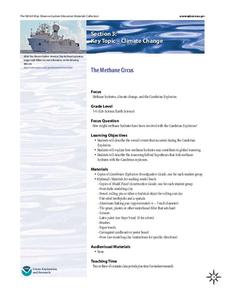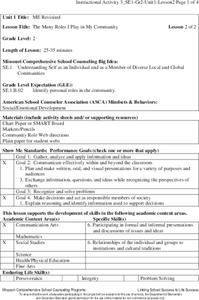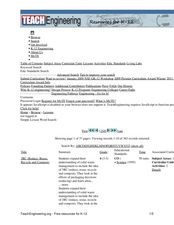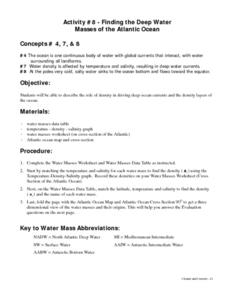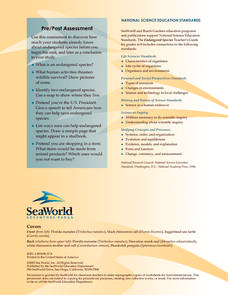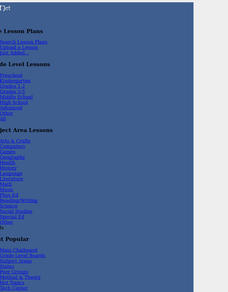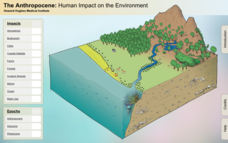Curated OER
Be Considerate of Others
Students explore the environment by participating in an outdoors activity. In this nature appreciation lesson, students discuss how to minimize their human imprint when experiencing nature. Students conduct a nature walk and plan out an...
NOAA
History's Thermometers
How is sea coral like a thermometer? Part three of a six-part series from NOAA describes how oceanographers can use coral growth to estimate water temperature over time. Life science pupils manipulate data to determine the age of corals...
NOAA
The Methane Circus
Step right up! An engaging research-centered lesson, the third in a series of six, has young archaeologists study the amazing animals of the Cambrian explosion. Working in groups, they profile a breathtaking and odd creature and learn...
Teach Engineering
Trash to Treasure!
One person's trash is another man's treasure. Challenge your class to build something useful out of the trash they throw away on a regular basis. Groups design and build a practical item from trash they collect, allowing the class to...
NOAA
The Incredible Carbon Journey: Play the Carbon Journey Game
Class members explore the carbon cycle in the final installment of the 10-part Discover Your Changing World series. They play a simulation game where they walk through the steps carbon takes as it cycles through the different layers of...
NOAA
Marine Policy
Save the oceans! The 22nd installment of a 23-part NOAA Enrichment in Marine sciences and Oceanography (NEMO) program focuses on laws and marine policy. Pupils take part in an activity investigating fisheries stock data.
NOAA
A Laboratory Simulation of Ocean Surface Currents
Stimulate interest in ocean currents with a simulation. The first installment of a five-part middle school series teaches future oceanographers about the forces that interact to cause ocean currents. A simulation shows how wind and the...
Space Awareness
Greenhouse Effect
A greenhouse provides additional warmth and protection to the plants inside, but what if the greenhouse gets too hot? Pupils discuss and experiment with the difference between natural and anthropogenic greenhouse effect. They measure the...
It's About Time
Volcanos and the Atmosphere
In the summer of 1815, snow fell every month in New England. Was this related to the volcanic eruption of Tambora in Indonesia earlier in the year? Young scientists design their own experiments to research the long-term effect a volcanic...
Missouri Department of Elementary
The Many Roles I Play in My Community
Small groups brainstorm their roles in the community. Then, individually, complete a community roles web worksheet. Peers share their completed product and extend the conversation to include the feelings and character traits that go...
Curated OER
It's About Time
Students create their own timeline. In this social science lesson plan, students write the important events that happened in their lives on their timeline and then compare their timeline to Earth's timeline.
Curated OER
Thar She Blows
Students discover the effects of El Nino on the global climate. As a class, they role play the role of a cold or warm wind and act out a skit in front of the class. They discuss the results of the role play once it is completed.
Curated OER
Tracking Narwhals in Greenland The Ocean Unicorn
Students study the ecology, habitats, geographic range and feeding habits of narwhals. They determine at least three reasons for the decline in the narwhal populations and complete the accompanying worksheets.
Curated OER
Cultures and Cuisines WebQuest
Students create and present a powerpoint presentation. In this cultures and cuisines research lesson, students select a country, interview someone from that country and visit a restaurant from that country. Students complete research...
Curated OER
Finding the Deep Water Masses of the Atlantic Ocean
Students describe the role of density in driving deep ocean currents and the density layers of the ocean. They determine that the ocean is one continuous body of water with global currents that interact, with water surrounding all...
Curated OER
Environmental Problems
Students explore the environment by completing environmental problem worksheets. In this pollution lesson, students identify the biggest threats to our environment such as deforestation, global warming, and pollution. Students utilize...
Curated OER
Endangered species
Students define the following words: extinction, endangered species, meteorite collision, glaciation and climate warming. They investigate that there are 307 species on the endangered list, and an average of 10-20 species are added each...
Curated OER
Feeling the Heat
Young scholars investigate the urban heat island effect. In this urban heat island effect lesson, students learn how trees, grass, asphalt, and other things on the school grounds effect temperature. They use the information to generalize...
Curated OER
What is a greenhouse?
Students experiment to gain understanding of how a greenhouse retains heat. In this greenhouse lesson, students work with soda bottles and simulate a greenhouse. Students compare data from a vented and intact bottle. Students record and...
Curated OER
First Contact
Sixth graders have an opportunity to enhance their computer skills by using Internet as a resource tool and a vehicle for global interaction with other students.
Curated OER
America's Heartland
Fifth graders investigate imports and exports to discover its importance to America as a world power. In this Imports and exports lesson, 5th graders discuss how climate and natural resources aid a country in becoming a world power....
Curated OER
Treading Lightly on Flag-Waving
Students explore the impact of world events on past Olympics as a springboard for understanding the cultural, political, and social climate surrounding the 2002 Winter Olympics after the events of September 11, 2001.
Polar Trec
Beacon Valley Weather
In Beacon Valley, katabatic winds regularly knock fit adults to the ground. The lesson plan compares the actual temperatures to the wind chill after factoring in katabatic winds in Beacon Valley. Scholars learn to calculate wind chill...
Howard Hughes Medical Institute
The Anthropocene: Human Impact on the Environment
Will human existence define an epoch? Many scientists think we are in a new epoch, the anthropocene, defined by humans and our impact on the environment. An online interactive demonstrates the immense impact humans have had on every part...




